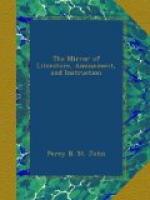Question 1.—A ship set sail at noon from Naples to Palermo (the distance between the two cities being 180 miles), and sailed at the rate of ten miles an hour; another ship set off at the same time, to sail from Palermo to Naples, at the rate of seven miles per hour: at what time did the ships meet each other, and what was the distance sailed by each? Vincent Zuccaro immediately replied—The first ship sailed 105 15/17 miles; the second, 74 2/17 miles. It was then observed to him, that he had only answered part of the question, and that the hour of meeting had been omitted. He then said this would be 10 10-17 hours after the time of the departure. The child had perceived that this part of the answer was implicitly contained in the former; which he also imagined the examiners perceived as well as himself, and therefore he omitted it.
Question 2.—In three successive attacks upon a town, a quarter of the assailants perished in the first attack, a fifth in the second, and a sixth in the last, when their number was reduced to 138 men. Required the original number? Answer, 360.
Q.—How did you find that number?
A.—If the number had been 60, there would eventually have remained 23; now 23 being the sixth of 138, the assailants were 6 times 60 or 360 at first.
Q.—Why did you suppose the number 60, rather than 50 or 70?
A.—Because neither 50 nor 70 are divisible by 4 or 6.
From these questions and replies, it will be readily understood that the child does not employ the ordinary artifices of mathematicians. Marquess Scriso, who was the first person to discover this singular talent, is about, with several other persons of distinction in the city, to solicit the aid of Government in the education of the child, every one being fully aware of the impropriety of subjecting him to the ordinary mode of education.
* * * * *
“OUT OF SEASON,” OR THE BEAU’S LAMENT.
(For the Mirror.)
“There is no labour so great as idleness.”
Heigho! what a blank is our being! ahi!
For there’s nobody left
in the town,
That’s nobody fit to associate with
me;
Dinner’s up, but my
spirits are down,
I can’t eat or drink (how should
I?) for sorrow,
And the lack of some usual
treat,
And I surely should hang me, or marry
tomorrow,
Were there not a few bawls
in the street.
Hang! marry! said I, why I’m now
drown’d in tears,
Who am wont in sham pain
to lose real;
And could pull my own house down, about
my own ears
For lack of amusements ideal;
But plays, concerts, shopping, Di’ramas
so bright,
That enlarge the pent mind
at a view,
Are fled with my friends; I’m the
wretchedest wight
That from devil ennui,
e’er look’d blue!




